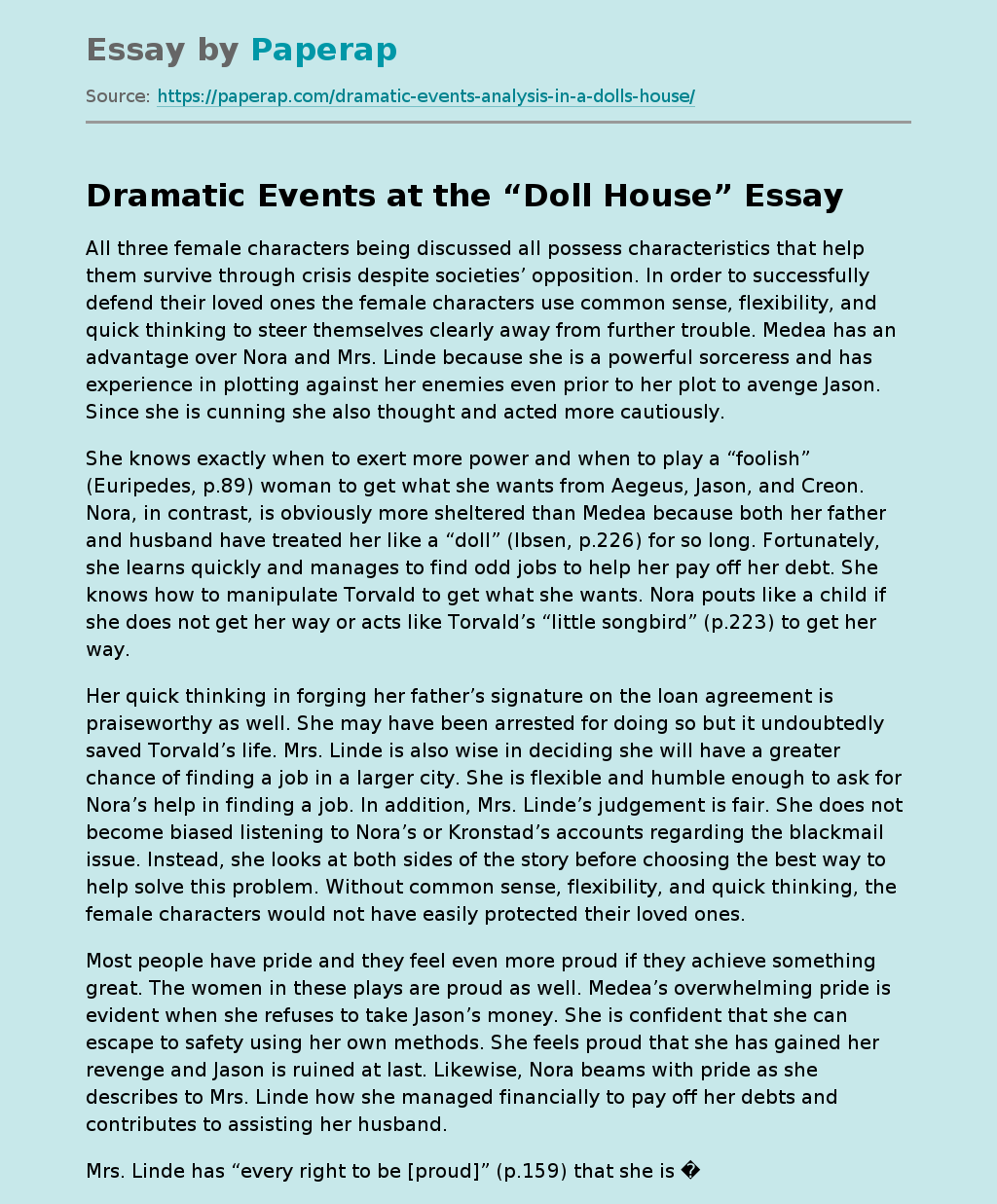Dramatic Events at the “Doll House”
All three female characters being discussed all possess characteristics that help them survive through crisis despite societies’ opposition. In order to successfully defend their loved ones the female characters use common sense, flexibility, and quick thinking to steer themselves clearly away from further trouble. Medea has an advantage over Nora and Mrs. Linde because she is a powerful sorceress and has experience in plotting against her enemies even prior to her plot to avenge Jason. Since she is cunning she also thought and acted more cautiously.
She knows exactly when to exert more power and when to play a “foolish” (Euripedes, p.89) woman to get what she wants from Aegeus, Jason, and Creon. Nora, in contrast, is obviously more sheltered than Medea because both her father and husband have treated her like a “doll” (Ibsen, p.226) for so long. Fortunately, she learns quickly and manages to find odd jobs to help her pay off her debt. She knows how to manipulate Torvald to get what she wants.
Nora pouts like a child if she does not get her way or acts like Torvald’s “little songbird” (p.223) to get her way.
Her quick thinking in forging her father’s signature on the loan agreement is praiseworthy as well. She may have been arrested for doing so but it undoubtedly saved Torvald’s life. Mrs. Linde is also wise in deciding she will have a greater chance of finding a job in a larger city. She is flexible and humble enough to ask for Nora’s help in finding a job.
In addition, Mrs. Linde’s judgement is fair. She does not become biased listening to Nora’s or Kronstad’s accounts regarding the blackmail issue. Instead, she looks at both sides of the story before choosing the best way to help solve this problem. Without common sense, flexibility, and quick thinking, the female characters would not have easily protected their loved ones.
Most people have pride and they feel even more proud if they achieve something great. The women in these plays are proud as well. Medea’s overwhelming pride is evident when she refuses to take Jason’s money. She is confident that she can escape to safety using her own methods. She feels proud that she has gained her revenge and Jason is ruined at last. Likewise, Nora beams with pride as she describes to Mrs. Linde how she managed financially to pay off her debts and contributes to assisting her husband.
Mrs. Linde has “every right to be [proud]” (p.159) that she is “[making her] Mother’s last days a little easier” (p.159) and raising her brothers even if she has worked so very hard to achieve this end. Her choice of not remarrying someone rich shows that she is content with working independently to support her family. When the women in these plays initiate the tasks to help their families they are doing it through instinct and are not motivated by any other incentives. Their rewards are more valuable than money for they are able to obtain pride and the sense of accomplishment.
The courageous acts that Medea, Nora, and Mrs. Linde have done to help others are triggered by dramatic events that are extremely realistic. The abandoning of a wife or family financial crisis could happen to women around the world as well as those in the play. There is certainly more assistance available for modern women in places like Canada in times of crisis, but that does not mean women are becoming more dependent. What were thought of as male characteristics in the plays are simply human characteristics and have simply been well adapted by modern women and by the female characters mentioned. Their accomplishments are admirable and demonstrate women’s vast ability to adapt to change.
Dramatic Events at the “Doll House”. (2019, Nov 27). Retrieved from https://paperap.com/dramatic-events-analysis-in-a-dolls-house/

